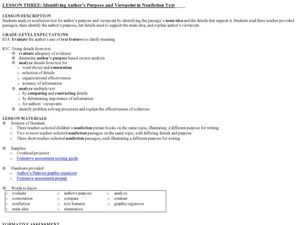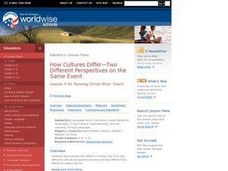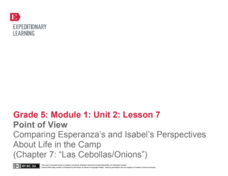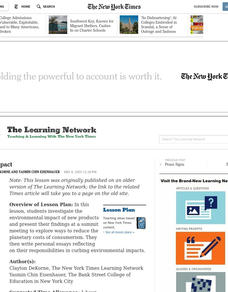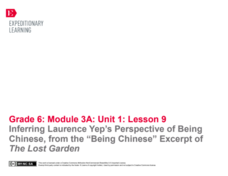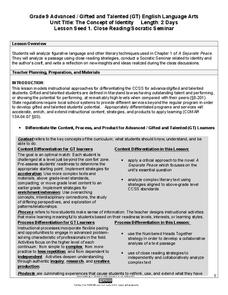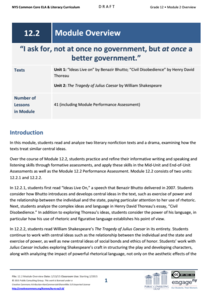Curated OER
Perspectives on September 11,2001
Fifth graders will learn about various perspectives around events. They will need to take on the perspectives of various key people during the September 11 attack. Then they will write in their journals about the incident. They read...
Curated OER
Identifying Author’s Purpose and Viewpoint in Nonfiction Text
Why do people write books? Pupils discover how to identify the author's viewpoint. They read non-fiction passages their instructor selects (the plan has the class look at nonfiction children's picture books), and then identify the...
EngageNY
Reading about the Author’s Perspective: Why Do Authors Write about Natural Disasters?
It's all about perspective. Scholars view a note from the author in Eight Days. They determine the gist and discuss what they can learn about the author's background based on the note. They then complete a fishbowl activity in...
EngageNY
Studying Conflicting Information: Varying Perspectives on the Pearl Harbor Attack, Part 2
Scholars take another look at Japan's Fourteen-Part Message. They then take turns adding ideas to sentence starters to create ideas about the different perspectives of government. To finish, groups mix and mingle to share their sentences...
Curated OER
The Hundred Penny Box with Multiple Viewpoints and Persuasive Letter
Third graders read The Hundred Penny Box and complete comprehension activities. In these perspectives and letter writing lessons, 3rd graders read and discuss the story then complete a Venn Diagram to explore the different viewpoints in...
Curated OER
How Cultures Differ "Two Different Perspectives on the Same Event
Students read excerpts from Peter Hessler's River Town: Two Years on the Yangtze and discuss his difficulties in learning the language, cultural clashes and how cultural perceptions shape our understanding of the world.
K12 Reader
Different Perspectives: The American Revolution
Prompt your young historians to hone in their reading comprehension skills by considering the fascinating perspective that Rudyard Kipling offers in his poem, "The American Rebellion", which provides an alternative...
EngageNY
Point of View: Comparing Esperanza's and Isabel's Perspectives About Life in the Camp (Chapter 7: "Las Cebollas/Onions")
Explore point of view and more with a Common Core-designed instructional activity. Learners experience different points of view by representing one of two characters from Esperanza Rising during a partner discussion. They must use...
Curated OER
Deep Impact
How can acknowledging opposing viewpoints reinforce one's argument? Use this New York Times lesson to study consumerism and the environmental impact of new products. After reading the article "Whether a Hummer or a Hybrid, the Big...
Curated OER
Cross-Cultural Dialogue Lesson
Students read and analyze a personal narrative written about a Peace Corps Volunteer teaching English in Guinea-Bissau, Africa. They discuss the concept of crossing cultures, analyze maps, complete worksheets, and develop a writing...
EngageNY
Presentation of Events: Comparing Two Authors
Give a little clue! Readers learn how context clues can help them determine the meaning of words by viewing a Context Clues Resource sheet then completing a Context Clues
practice sheet. They then compare events presented by two...
Curated OER
Twisted Tales
Experience how a story can drastically change when the point of view is altered. Young scholars first read a review of Disney's film Tarzan, focusing on how the point of view in the classic story is important. They then select...
Curated OER
Laughing Matters
Is laughter really the best medicine? Middle and high schoolers discuss the truth behind this adage by reading and discussing a New York Times article about Dr. Patch Adams. They participate in a round-table debate in response to...
Curated OER
Hey, Teacher, Leave My Kids Alone
What are the differences between homeschooling, traditional schooling, and unschooling? Middle and high schoolers examine the opinions of their peers on these varied types of education. After reading a New York Times article, they...
Curated OER
Bombs Away!
Examine the different perspectives on the future of United States Navy bombing exercises taking place on Vieques, Puerto Rico with this lesson plan from The New York Times. Here, young learners read "Islanders to Vote on Vieques Bomb...
Curated OER
Does Rick Warren Represent Diversity?
The topic of this lesson focuses on whether or not Obama was able to convincingly defend his choice of choosing Rick Warren to deliver the invocation at his inauguration. This is considered a controversial or hot topic because it...
Curated OER
Lesson: Storyboarding Revolution
Kids consider revolution as a basis for creativity, art, and storytelling. After reading an excerpt from the book, Persepolis, learners choose one event from any world revolution to write about. They storyboard the event focusing on...
Curated OER
Black Power
Use this New York Times lesson plan to research contemporary leaders in the African-American community. After reading the article "Blacks Weigh the Impact of the Post-Jackson Years," middle and high schoolers discuss the varying...
EngageNY
Introducing The Lost Garden and Finding Evidence of Laurence Yep’s Perspective on What It’s like to Fit into Another Culture on Pages 66– 67 of Dragonwings
How does culture shape perspective? Pupils consider the question as they read an excerpt from Laurence Yep's autobiography, The Lost Garden. Using a graphic organizer, they gather textual evidence and make inferences about the author's...
EngageNY
Inferring Laurence Yep’s Perspective of Being Chinese, from the “Being Chinese” Excerpt of The Lost Garden
It's all about perspective! Using the resource, scholars read a third excerpt from Laurence Yep's autobiography, The Lost Garden. As they read, individuals complete graphic organizers using clues from the text to infer the author's...
EngageNY
Analyzing the Author’s Perspective: “The Shakespeare Shakedown”
Simon Schama's article "The Shakespeare Shakedown" allows young writers to see how authors respond to conflicting viewpoints. Class members participate in discussion appointments with five peers to explore the author's point of view.
Maryland Department of Education
The Concept of Identity Lesson 1: Close Reading/Socratic Seminar
John Knowles' A Separate Peace provides readers with an opportunity to develop their close reading and analytical skills as they look for what Knowles feels are the factors that shape our identity.
EngageNY
End of Unit Assessment: Perspectives on Natural Disasters
Caption this! Scholars complete the end of unit assessment by rereading In the Middle of the
Storm. Learners answer written response questions about the text, and then create drawings to accompany their work. To finish, they caption...
EngageNY
Grade 12 ELA Module 2
The second module in a series for high school seniors focuses on tracking the central idea of a text across genres and from multiple author and character perspectives. Twelfth graders read a speech by Benazir Bhutto entitled "Ideas Live...



